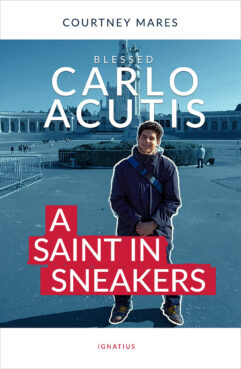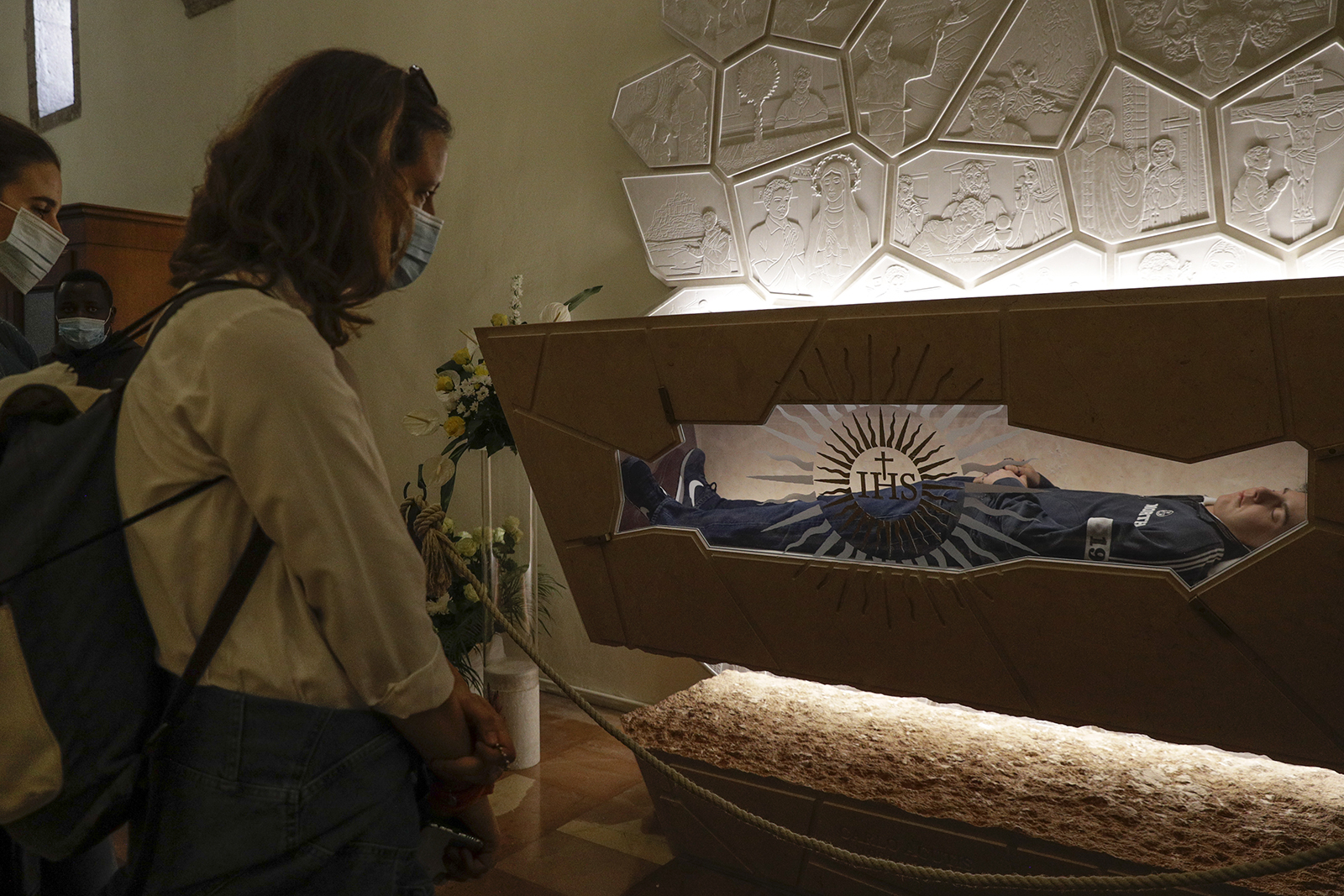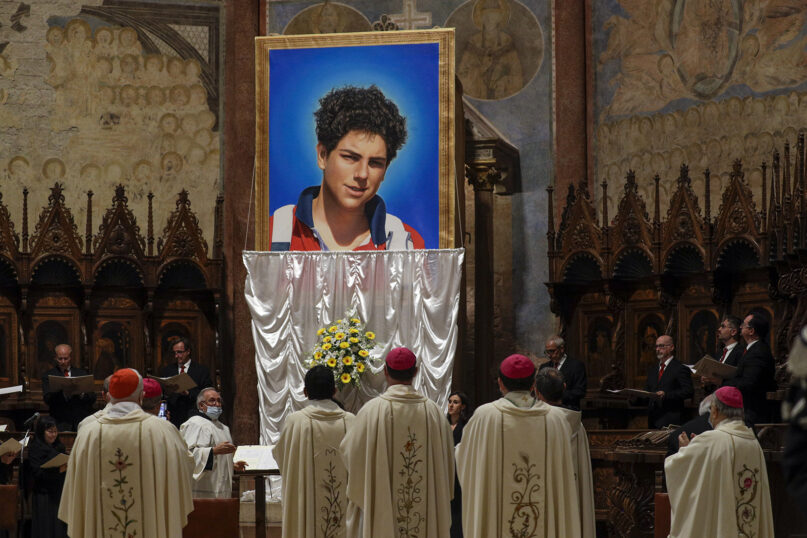VATICAN CITY (RNS) — In a new book, “Blessed Carlo Acutis: A Saint in Sneakers,” Vatican journalist Courtney Mares tells the story of how an average ’90s kid who loved computers ended up on the path to sainthood and how his life inspires Catholics in today’s digital age.
In life, Acutis combined a profound devotion for the Eucharist, which he described as his “highway to heaven,” with a sincere passion for computers and video games. He died of leukemia in 2006 at the age of 15, but his death sent ripples through the community that surrounded him and beyond. Pope Francis made Acutis blessed, a first step toward sainthood in the Catholic Church, in October 2020.
“As a computer-programming Millennial on the path to sainthood, Carlo has shown that Apple computers, Spiderman comics, and Super Mario on Nintendo 64 and a life of heroic virtue are not mutually exclusive,” said Mares, answering questions by Religion News Service via email.
Mares said she was drawn to Acutis’ story because of how it showcased holiness in the 21st century. “Carlo’s story challenges us — not because he was crucified upside down or burned alive or shipwrecked on a missionary journey — but precisely because he lived a life of heroic virtue by living a relatively normal life for a kid in the 1990s and early 2000s,” she added.

“Blessed Carlo Acutis: A Saint in Sneakers” by Courtney Mares. Courtesy image
In the book, Mares talks about Acutis’ popularity “going viral” after his death, with his name being Googled more often at the time of his beatification than that of Pope Francis. Acutis’ life inspired a video game developer in seeking to create a game that attempts to immerse players in the lives of saints. Mares also said she has heard of Catholics asking for Acutis’ intercession when facing an IT issue.
Nicknamed “God’s influencer,” the Italian teen has garnered attention all over the world. From Australia to Latin America, Catholic buildings and activities are being named after him. In the Philippines, 36,000 people tuned in on Facebook to watch a procession honoring his birth.
Acutis is the official patron of the upcoming World Youth Day in Lisbon, Portugal, this July where Pope Francis will be in attendance. According to the author, it will ensure that “even more young people from around the world can hear his story for the first time and be inspired by his witness.”
While Mares said there is “no official news yet” regarding Acutis’ sainthood cause, an investigation into an alleged miracle is underway in the Diocese of Florence. A miracle attributed to Acutis was recognized in 2020, when a 6-year-old boy suffering from a rare genetic pancreatic disease was suddenly healed after praying to Acutis. A second miracle needs to be recognized for Acutis to be given a halo.
The book shows how Acutis strived toward holiness not only through great gestures, but also by practicing small acts of faith, from helping out in his community to going to daily Mass and sharing his beliefs with others. It also showcases how Acutis avoided some of the trappings of modern technology by remembering to put other people and his faith first.
Acutis died before the launch of the iPhone or TikTok’s rise in popularity, Mares said, and “barely lived to see the first-ever cat video uploaded to the internet.” But as a saint he can be an inspiration for Catholics seeking a way to use these technologies for good, she added.
In a chapter called “What Carlo Can Teach Gen Z,” the book cites studies showing how many adolescents today who are exposed to the digital world suffer from depression and have suicidal thoughts. “Carlo Acutis loved computers, but he did not lose himself in an online world, spending all day gaming without leaving the house. He remained firmly planted through his daily interactions with other people and the sacraments,” Mares said.
Acutis had a strong fascination with the sacrament of the Eucharist, where Catholics believe the real presence of Jesus is felt. Acutis chased evidence of Eucharistic miracles, which he believed would lead lapsed Catholics to return to Mass, Mares explained. He was fascinated by reported cases in the Italian town of Lanciano or in Buenos Aires of the Eucharist turning into flesh and sought scientific evidence for these miracles.

The body of Carlo Acutis, an Italian boy who died in 2006 of leukemia, lies in state ahead of being beatified in Assisi, Italy, Oct. 10, 2020. (AP Photo/Gregorio Borgia)
U.S. bishops chose Acutis to be the patron of their Eucharistic revival initiative to raise awareness, understanding and enthusiasm for the sacrament.
The teen can also be an inspiration for those who face suffering and pain in life, Mares said. Despite dying at such a young age, “he was ready to go. He had lived his life for God and understood that death was not a moment to be dreaded, but a moment to surrender all to Jesus,” she said.
Over the course of five years, Mares conducted dozens of interviews with not only friends and relatives of Acutis, but also with many whose lives were touched by his example. One woman in the United States spoke about how the young saint inspired her after she was diagnosed with breast cancer, leading her to visit his tomb in the Italian town of Assisi, which is also the resting place of the famous St. Francis.
Mares hopes more people will pray to Acutis. “With one more miracle attributed to his intercession approved by the Vatican, the Catholic Church will have its first computer-coding saint,” she said.





